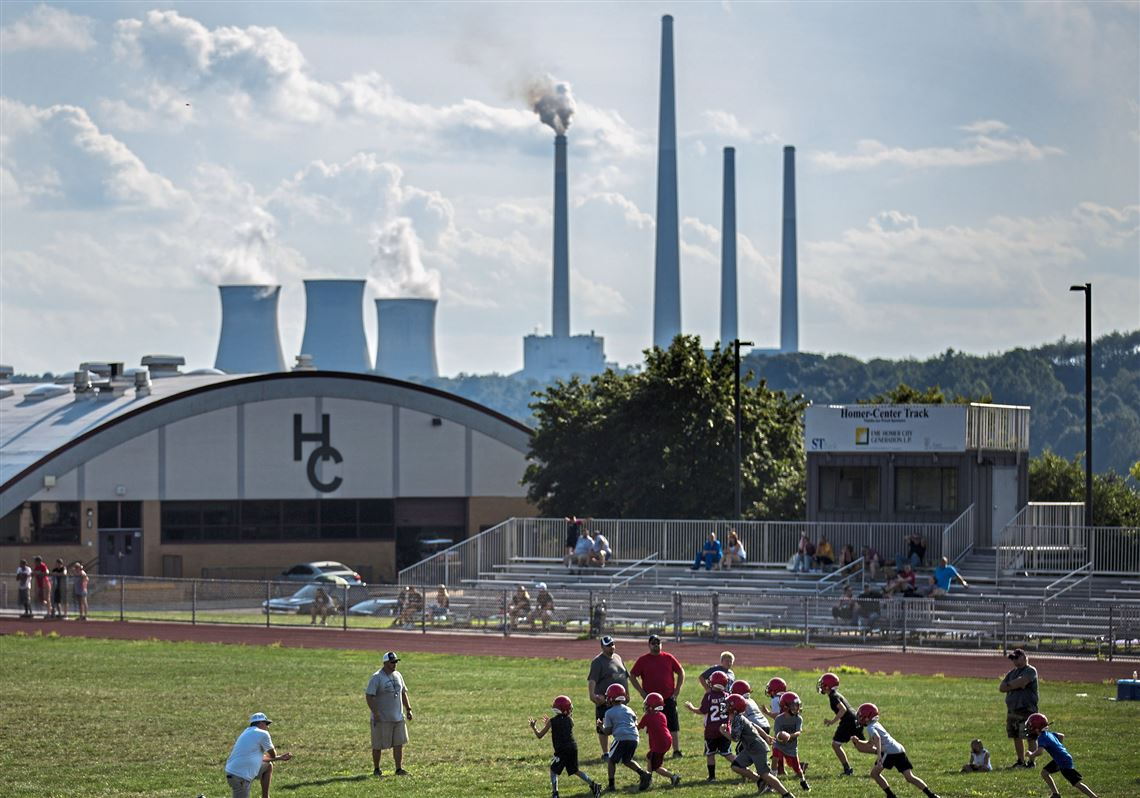
Photo credit: Pittsburgh Post-Gazette (https://bit.ly/3nDFILV)
Pennsylvania is the third-largest greenhouse gas polluting state and has the fifth dirtiest power plant sector in the nation. To deal with this problem, the Wolf administration has proposed a rule to cut carbon pollution from electric power plants. This would link Pennsylvania to the Regional Greenhouse Gas Initiative (“RGGI,” pronounced Reggie), a market-based cap-and-invest program through which we can achieve significant pollution reductions and spur economic development through investment in infrastructure, renewable energy, and energy efficiency.
RGGI is a complex cap-and-trade program involving all New England states and a few mid-Atlantic states: Connecticut, Delaware, Maine, Maryland, Massachusetts, New Hampshire, New Jersey, New York, Rhode Island, Vermont, and Virginia, with Pennsylvania scheduled to join in 2022. The program monitors all of the Carbon Dioxide (“CO2”) emitted from fossil fuel power plants in the participating states and sets a cap on how much CO2 can be emitted in these states. The states then sell allowances which permit each power plant to emit a certain amount of CO2. The states also create a reduction plan to decrease CO2 emissions over a specified time. Therefore, RGGI has and will result in an overall decrease in CO2 among all the participating states.
How Will RGGI Help?
Since the program began in 2009, CO2 emissions from power plants in the participating states have dropped by 47%. Just as important, economic growth in the RGGI states outperformed the rest of the country by over 30%. Here in Pennsylvania, the Department of Environmental Protection (“DEP”) has forecasted that RGGI will result in statewide economic benefits. For example, by participating in RGGI, Pennsylvania is predicted to gain over 27,000 jobs and nearly $2 billion in Gross State Product. Simultaneously, RGGI is projected to cut carbon pollution from power plants in the Commonwealth by over 180 million tons.
RGGI Comes with EJ Issues that Must be Addressed
Here at CCJ, we applaud the DEP for taking these steps in the proposed RGGI rulemaking. It is a single step in the correct direction that will lower carbon pollution and create thousands of jobs. However, this draft rule has its deficiencies. While climate change affects everyone, it has a devastating impact on the state’s low-income residents, communities of color, immigrants, and other vulnerable populations. The RGGI rule does not provide adequate assurances that these communities will not see adverse health and environmental repercussions. This could happen in several ways. One of our primary concerns is that under the RGGI program, emissions credits might disproportionately end up in dirtier plants’ hands, which may themselves be disproportionately located in disadvantaged communities. Some power producers could decide to shift generation and/or build new power plants in these areas because it is cheaper, which would create “hot spots:” Emissions may decrease statewide but actually increase in certain communities. Historically, many of these power plants have been developed in EJ communities, and the DEP must take this possible threat seriously.
Additionally, the direct effect of RGGI is likely to be regressive: it will disproportionately burden low-income households with higher energy prices as producers pass emissions-reduction costs on to consumers. Again, the fossil fuel power plants will incur an additional expense to operate. This, in turn, will likely be pushed back onto the ratepayer. Lower-income households already spend a larger percentage of their income on utility bills. Even a small increase means that another household budget item would be compromised.
Lastly, RGGI is a cap-and-invest program that only works if funds are generated. However, under Pennsylvania’s draft rule of RGGI, the DEP provides exemptions to certain types of polluters. Set-aside credits allow some fossil fuel power plants to pollute without paying into the program. Therefore, by allowing certain fossil fuel power plants to not pay for their emissions, the state loses one of the central pillars of an effective cap-and-invest program. What the state, and in theory, the taxpayers, gain is polluted air without any funding to help clean it.
CCJ, with Your Help, Can Ask the DEP to Take the Right Steps to Protect All in the State
Currently, the DEP is conducting a public hearing on this very issue. Public hearings are a chance for us, the public, to share with the DEP what we like and do not like in a proposed rulemaking. We can educate them on what they have right and what they have wrong.
CCJ will be submitting verbal and written comments to the DEP explaining that, yes, the overall goal of RGGI is great for the environment, our economy, and our state’s future. Yet, we need to ensure that the DEP is placing the appropriate steps in the right places to ensure everyone’s health and wellbeing are considered.
Here are CCJ’s Suggestions to Ensure All are Given Adequate Protection
To protect EJ and low-income communities, the DEP must make an informed decision on every air pollution permit application. This decision must be based at a macro level. Information such as the residents’ testimony, current and proposed ambient air quality, permittee’s violation history, public benefit, population statistics, nearby schools, long-term care facilities, nursing homes, and cost-benefit analysis must be considered.
Adaptive management is crucial. RGGI should contain specific mechanisms to study the impacts and adjust for effects that are unexpected or undesirable. A vague commitment to the concept of adaptive management is not sufficient; specific, mandatory follow-up measures must be integrated into the regulations where possible. We know there are often unforeseen flaws that require modification after a cap-and-invest system like RGGI is in place. That is why it is essential to conduct the appropriate studies and report the findings to the public.
To ensure that low-income households do not face higher energy costs as a result of RGGI, Pennsylvania should use auction revenues to counter the impact of power generators externalizing the cost onto ratepayers. One advantage to RGGI, as opposed to more conventional regulation, is that while both may increase consumers’ prices, allowance auctioning provides a funded mechanism for countering the effect.
The Department should not allow certain fossil fuel power plants to completely externalize the cost of pollution. RGGI can be tailored to fit the needs of the Commonwealth. Currently, the Commonwealth requires a cap-and-invest program that will lower emissions and earn funds. Therefore, by allowing certain fossil fuel power plants (like waste coal power plants) to not pay anything for their emissions, the state loses one of the central pillars of an effective cap-and-invest program. Instead, the RGGI program should charge a reduced rate for the same power plants. By charging a reduced rate, the goal of lowering emission levels and generating funds are both met without the burden of that facility’s air pollution falling exclusively on the state and the surrounding residents.

